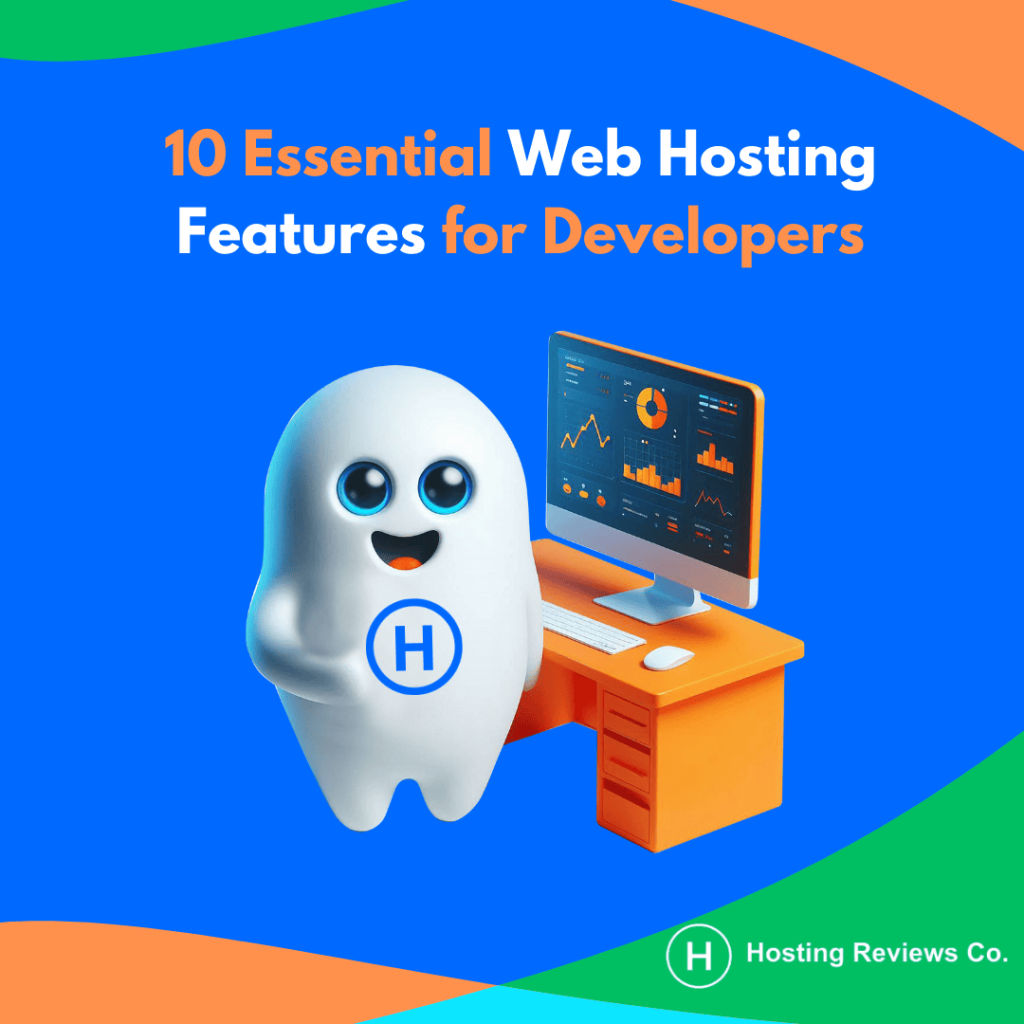Choosing a web hosting provider as a developer isn’t just about picking a place to store files. Finding the right web hosting features for developers ensures the flexibility, speed, and control needed to build, test, and deploy projects without frustration.
If you’ve ever worked with a hosting provider that lacked key features, you know the pain—slow deployment, limited access, security headaches, or constant performance issues. And let’s be honest, troubleshooting server problems that shouldn’t exist in the first place is a productivity killer.
So, what exactly should we look for? Here are 10 essential web hosting features for developers that you need to know.

Best Web Hosting Features for Developers
1. High Performance and Fast Loading Times
Speed isn’t just about user experience—it directly affects development. A sluggish server means longer testing times, delayed deployments, and frustration when working with dynamic applications.
Imagine trying to debug a feature, but every page reload takes five seconds. That adds up quickly. A good hosting provider offers SSD storage, optimized caching, and high-speed infrastructure to keep things running smoothly.
2. Full Root or SSH Access for Complete Control
Developers need control. Shared hosting with a restrictive control panel won’t cut it. Full SSH (Secure Shell) or root access lets us install software, configure settings, and manage our environment the way we want.
Without SSH access, even something as simple as pulling updates from Git or managing dependencies can become an unnecessary hassle.
3. Scalability for Growth and Traffic Spikes
You might start small, but what happens when traffic surges? Not all hosting providers handle scaling well.
A solid hosting solution should allow us to seamlessly upgrade resources—whether it’s CPU, RAM, or bandwidth—without downtime. If a provider forces a full migration just to scale up, that’s a red flag.
4. Built-In Version Control and Git Integration
No developer wants to manually upload files every time they push updates. Git integration makes deployment seamless.
Without it, we’re stuck downloading and re-uploading files or using third-party workarounds. A developer-friendly host should offer Git, Bitbucket, or at least an easy way to sync repositories directly from the command line.
5. Automated Backups to Prevent Catastrophe
Ever lost hours (or days) of work due to a bad deployment? It happens.
A hosting provider with daily automatic backups can save us from disaster. If an update breaks everything or a client decides they want the “previous version” back (after insisting on changes), backups are a lifesaver.
6. Support for Multiple Programming Languages
A good hosting provider shouldn’t box us into one tech stack. Some limit users to PHP, but what if we’re working with Python, Node.js, or Ruby?
A developer-friendly host supports multiple languages and offers flexibility for different frameworks, so we’re not forced to switch hosts just because of a project’s requirements.
7. Reliable Security Features to Protect Our Work
Security isn’t just for enterprise clients. If a hosting provider lacks proper firewalls, DDoS protection, or malware scanning, our applications (and data) are at risk.
Nobody wants to wake up to a hacked site or malware warnings. Choosing a host with SSL encryption, automated security patches, and proactive monitoring makes all the difference.
8. Database Management That Doesn’t Feel Like a Chore
Most applications rely on databases, so a hosting provider should offer easy MySQL, PostgreSQL, or MongoDB management. If accessing, backing up, or optimizing databases feels like a struggle, the host isn’t developer-friendly.
Good hosting includes phpMyAdmin, direct SQL access, and the ability to tweak performance settings without limitations.
9. Staging Environments for Testing Before Deployment
Ever pushed an update directly to production, only to realize something broke? That’s why staging environments exist.
A hosting provider with one-click staging allows us to test changes before going live. Without this, we’re forced to risk pushing untested code or setting up manual workarounds.
10. Responsive, Developer-Savvy Support
At some point, we’ll need help—whether it’s a server issue, a DNS problem, or something breaking unexpectedly. The difference between a good and bad host often comes down to support quality.
If a hosting provider’s support team doesn’t understand development (or just pastes generic responses), it can turn a small issue into a major problem. Look for 24/7 support with real tech experts who understand server-side troubleshooting.
Final Thoughts
Not all hosting providers are built with developers in mind. If we choose the wrong one, we’ll waste time fighting limitations instead of focusing on development. The right hosting service should make our workflow smoother, not more complicated.
Before committing to a provider, check for these 10 essential web hosting features for developers—it’ll save countless headaches down the road.
Choosing the right web hosting for developers ensures you get the performance, flexibility, and control needed for seamless development.
Some of the best WordPress hosting for developers include:
- Cloudways – Ideal for developers who need managed cloud hosting with flexible scaling, SSH access, and staging environments.
- SiteGround – A solid choice for WordPress developers, offering Git integration, staging, and reliable performance.
- DigitalOcean – Popular for its simplicity, developer-centric approach, and scalable droplets for easy project management.
- Kinsta – Best for developers seeking premium performance, advanced tools, and top-tier security.
The best option depends on specific needs—whether it’s managed hosting for convenience, VPS for control, or cloud solutions for scalability. The right platform saves time, enhances performance, and streamlines development.

Leave feedback about this